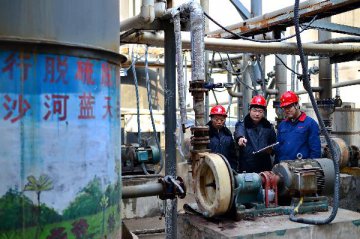
Russia's economy growth accelerated in the second quarter of 2017 and is likely to exceed 2 percent for the entire year, Russian Economic Development Ministry said Wednesday.
"The Russian GDP, according to our estimates, grew in the second quarter by approximately 2.7 percent year-on-year. We estimate the economy growth in the first half of the year at 1.6 percent," Russian Economic Development Minister Maxim Oreshkin was cited by Sputnik news agency as saying.
Based on the encouraging performance of the past quarter, Oreshkin said the ministry's previous two-percent forecast for economic growth this year now "seems a little conservative." "We expect further strengthening of positive tendencies in the economy this fall," Oreshkin said, highlighting the gradual recovery of wages and income.
Russia's economy has worsened since 2014 due to low oil prices and Western sanctions over the Ukraine crisis. Official data showed that its GDP fell 0.2 percent year-on-year in 2016, compared with a 2.8 percent drop in 2015.
Russian officials have predicted the country's GDP would grow by 1.5 to 2.0 percent this year. Speaking of the brewing new round of U.S. sanctions, Oreshkin said they will not seriously affect Russia's economy or the rouble exchange rate.
"As a matter of fact, our macroeconomic policy is arranged in such a way that external shocks connected with sanctions, have not had a very serious impact on the Russian economy," he said. "We have a floating exchange rate. There are always fluctuations, so here some movement is possible, but we expect absolutely nothing out of the ordinary," he added.
The minister also said the sanctions would not lead to a drastic revision in the macroeconomic forecast, since the ministry had expected "overall deterioration in capital flows" in the second half.
On Tuesday, the U.S. House of Representatives passed a bill by an overwhelming majority that would impose sweeping sanctions on Russia. The bill must now pass the U.S. Senate before being signed into law or vetoed by U.S. President Donald Trump.






















Latest comments